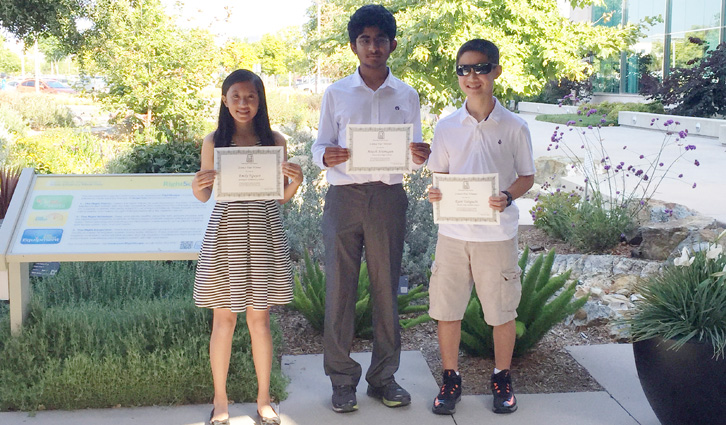-
Published: Jun 14, 2016 | 09:00 AM
Four IUSD Science Fair Winners Honored by IRWD Board
Four Irvine Unified School District students were honored at the June 13 Board meeting for their water-related science fair projects.
The students were presented with certificates and each of their schools will receive $100 on their behalf for science programs, with an additional $100 going to support the district science fair.
IRWD has supported the science fair since its inception. In the fall, IRWD professionals participate in Ask-a-Scientist Night, which offers the students the opportunity to get their questions answered about their prospective projects.
This year’s science fair was held at Irvine High School. IRWD Water Quality experts Mindy Bergen and Michele Drzymowski judged more than 35 water-related projects based on the use of the scientific method, creativity, relevance, completeness of the project and evidence of problem solving.
This year’s winners:
- Emily Nguyen, grade 6, Stonegate Elementary, “You Can Help Solve the Drought Problem.” Emily sought to discover how greywater from different sources, such as from dishwashers, showers and clothes washers affected plant growth. She believed that plants would survive the soaps from the greywater because they are themselves plant-based. The PH level of greywater is close to what plants need to survive. Her experiment took around four weeks and at the end, Emily’s hypothesis that the plants would survive turned out to be correct.
- Ryan Takiguchi, grade 7, South Lake Middle School, “Life Sustaining Dirt: Which Soil Base Sustains Life the Longest Without Water?” Ryan said that growing up in California and dealing with drought has made him aware that drought-tolerant gardens are important, but can be expensive to install. He believes if you want to do it right, you have to use the most affective materials. So he decided to research which soils would best sustain plants and hypothesized that potting soil would be more able to sustain life with the least water. He potted aloe vera plants separately in sand, gravel, potting soil, and aquaponic clay balls. Over 10 days, he monitored the plants, concluding that it was not the potting soil that sustained the plants, but the aquaponics clay balls were the most effective.
- Ainesh Arumugan, grade 9, University High School, “Smart Irrigation Controller.” Ainesh had the drought in mind when he began his project, with the goal to develop a low-cost smart irrigation controller. His project used a processing and controlling unit, a camera and relays to control the irrigation system. According to his tests and analysis of data, his irrigation controller had reduced the water applied for healthy grass and increased the water for dehydrated grass. After 15 days, the dehydrated grass returned to a healthy state and the controller reduced the watering schedule. He met his objectives of developing the necessary hardware to maintain plant health and had greater efficiency when watering grass and other vegetation. His project was able to meet his design criteria. Ainesh’s project went to the county competition, where he took a first place award in the Environmental science/environmental engineering division. His project then moved onto the state competition, where he received a $1,200 award from the California Water Environmental Association.
- Harrison Ku, grade 11, University High School, “Seawater Desalination Using a Microfluidic Electrodialytic Cell Based on Laminar Flow.” Harrison’s project sought to test the capability of a novel microfluidic chip design in desalinating water with multiple parameters. The effects of changes in flow rate and electric potential on output concentration were analyzed. He found that a little more than three runs through the cell on average are required for water to be completely desalinated. He concluded that even though multiple runs are required, the desalination method presented in his project held many more advantaged over other methods. Harrison’s project was selected to compete at the county science fair where he won second place in the Environmental science and environmental engineering division. He also received the science fair’s Nat Lamm memorial award. He also received an award from the Orange County Sanitation District and a Gold Award from the Orange County Water District.
Learn more about IRWD’s education programs on our website.



